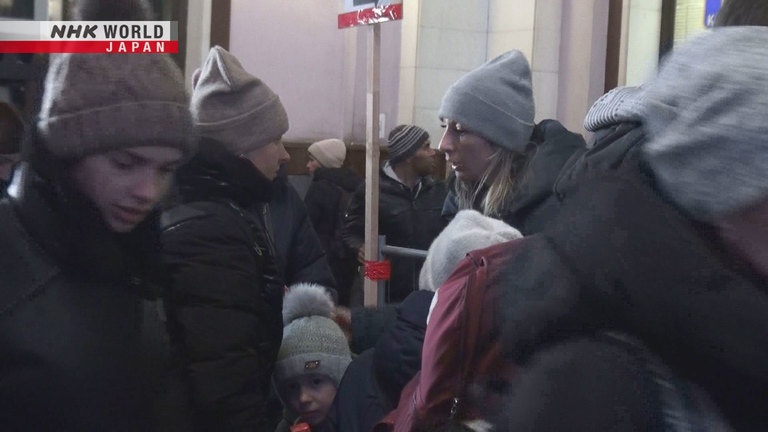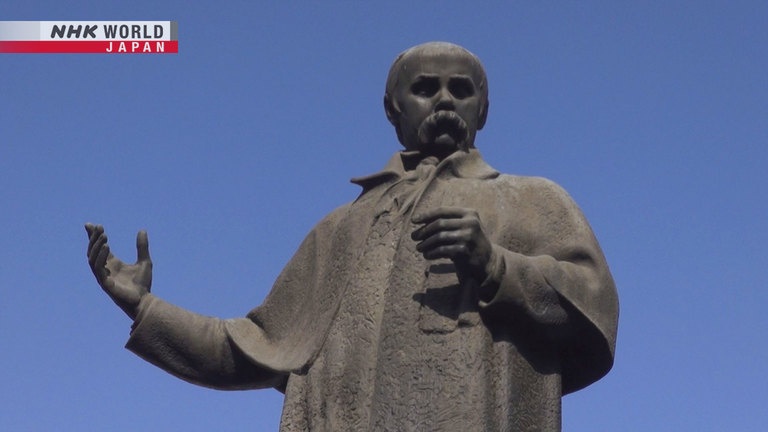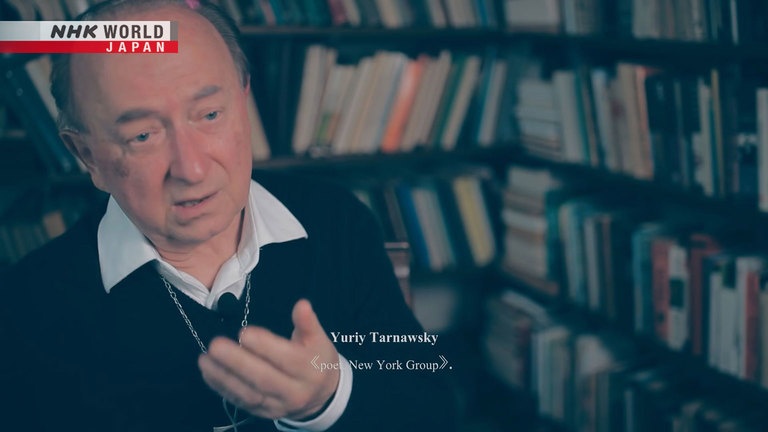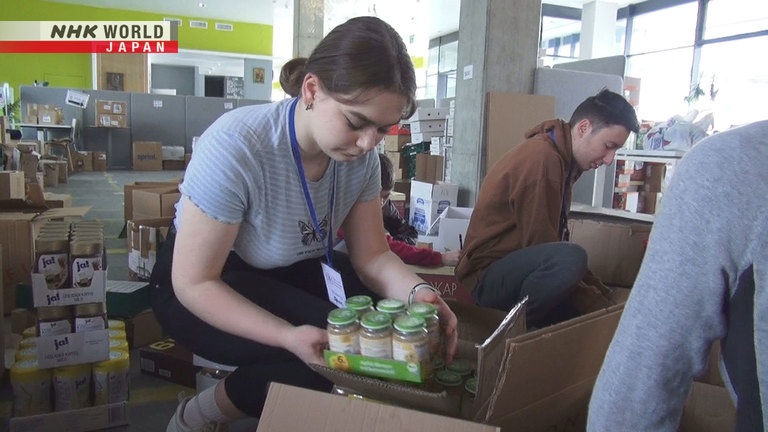Ukraine as the Breakwater for Europe: Oleksandr Frazé-Frazénko / Poet, Musician, Filmmaker
A poet living in western Ukraine, created rap songs to call for resistance to Russian invasion. He speaks to the world for people to realize more about what is currently happening in Ukraine.




Transcript
Direct Talk
This is the city of Lviv in western Ukraine.
People are pouring into the city
as fierce fighting with Russian forces
continue in the eastern parts of the country.
Oleksandr Fraze-Frazenko
Poet, Musician, Filmmaker
Oleksandr Fraze-Frazenko is a poet
and a musician who lives here.
He started creating rap songs
calling for resistance to Russia
when the war broke out.
I don't care what your name is.
Putin Lenin or Stalin.
I don't care if it's dark.
I don't care if I'm delirious.
Ukraine has historically
faced threats from its eastern neighbor
Frazenko says
the current struggle with Russia
is about defending not just his country,
but the rest of Europe.
The hope is to become visible
for Europe and for the Western world.
They should accept the fact
that we are the cradle
of the European culture in a way.
He speaks to the world
for people to realize more about
what is currently happening in Ukraine.
Ukraine as the Breakwater for Europe
Lviv, Ukraine
Air raid sirens go off in Lviv
almost every day.
On February 24th,
Russian President Vladimir Putin
announced the start of
a military operation in eastern Ukraine.
When this was announced Frazenko was spending
time with his family in Lviv as usual.
That was a regular day.
My son just woke up.
We were preparing for the kindergarten.
Then, we heard the sirens.
My feeling was calm
because...
prediction, it's not the right word,
but if you learn history,
you know that
certain things happen at certain times.
The time is circular,
so it will happen again.
I had that feeling that...
sometime Russia would try
to invade Ukraine
because they already did
during the First World War,
during the Second World War.
He says Russians can't tell the difference
between the Ukrainian pronunciation
of strawberry and bread.
It's how he expresses resistance.
Klubnika palyanista
(Strawberry bread)
Klubnika palyanista
(Strawberry bread)
Shoot my gun
Klubnika palyanista
(Strawberry bread)
My frontline is the different frontline.
It's the frontline of ideas.
If you are an artist, for example, as I am,
you should do art.
If you are an artist,
people used to listen to you,
what do you think,
what do you think about something?
You can try to think about stuff
and make up some ideas,
some statements.
Frazenko was born in Lviv
that has various ethnic groups
including Jewish and French backgrounds.
He loved writing poetry
since he was a young boy.
He became a student of a renowned poet
and began creating his own pieces.
Ihor Kalynets
Poet
It started to build up a friendship between
the old classic poet and a young boy.
From that time, I knew that
I want to be in poetry.
Years after, I realized that
poetry is the most powerful way
of expressing in art
because the distance
between the sparkling idea
and the realization of this idea,
the product, is too short.
So short.
It cannot evaporate during the realization.
I thought that that's
the recipe for the great piece of art.
Frazenko likes the works of Taras Shevchenko,
who is considered a pioneer
in modern Ukrainian literature.
Shevchenko spent 10 years in exile for writing
a poem critical of the Russian emperor.
Shevchenko as a figure is
some kind of a symbol of Ukrainian liberation
because he used to live in the czar's castle
almost half of his life.
The first part of his life, he was a slave.
Then, he started to write poems
about Ukrainian liberation
based on stories that
he got from his grandpa,
because his grandpa used to be a Cossack
and used to fight for Ukrainian liberation
against Russians
and against Polish people.
And he became the symbol of this liberation.
He will always be this
connection point for Ukrainians.
Frazenko began writing poetry,
but faced a big hurdle.
I was always fascinated in modernist poetry,
surrealist poetry.
I could not find anything like this
in the Ukrainian poetry.
I was wondering "why?"
Then, I realized that it was prohibited
to write something like that
in Ukraine during the Soviet period
because you are going to
go to jail for that
just because your thoughts are
too dark to the Soviet men.
I started to look for those guys.
I found them.
Those poets that escaped the Soviet Union
during the First World War,
and also children of people that escaped
the Soviet Union during the Second World War,
and found themselves in the US,
especially in New York, in Manhattan.
Yuriy Tarnawsky
Poet
Frazenko moved to New York in 2015.
There he met poets who were
in search of creative freedom
after being persecuted
in the former Soviet Union.
I started to read those poems.
They just fascinated me right away.
They decided we are not
going to write in English.
They decided we should build
a Ukrainian literature away from Ukraine,
because no one will if we give up.
Franzeko produced a film about them.
The Story of New York Group of Poets
The piece depicts the strong feelings
of the poets for their homeland.
Our culture is very specific.
It is still shock so to speak
We are traumatized by years of thralldom,
communism.
Communism broke everything.
They started to make
some shows, gigs and stuff,
just to promote that idea
that Ukrainian literature is alive
and it's up to date,
and it's working.
When I realized that
those guys made this thing,
I immediately felt that those are my guys.
That that's my roots.
So this one is my last one.
It's bilingual.
It's published in New York Queens.
Frazenko divides his time
between New York and Lviv.
He believes the world needs to know
more about how Russia
is trying to erase
Ukraine's history and culture.
They should realize that
you cannot steal a culture.
You cannot steal the name of the country.
You cannot steal the heritage and stuff
and just go away with this.
People will know.
People will understand what's happening.
Right now, it starts to grow.
Lviv is an ancient medieval city
that's also a World Heritage Site.
It was ruled by the Austro-Hungarian Empire
and Poland.
and it became part of
the Soviet Union after World War 2.
Lviv used to be the capital
of the biggest kingdom in Europe,
Galician kingdom, during the times of
King Danilo and King Schwerner.
Then, Lviv used to be the capital of
one of the biggest regions
in Austrian-Hungarian Empire.
Lviv forgot about those pages of history.
But I think those things
will be up again after this war
because we will be trying to find
our identity as the Europeans.
Ukraine has a history
of struggles against the East.
Frazenko says these fights
were not only to preserve Ukraine.
We used to protect Europe
from Eastern invaders
during the centuries.
All that progress that Europe used to have,
it's because of us,
because we used to be the border between
Europe and the Eastern part of the world.
Right now, Europe should realize that
this is the time when we need a favor back.
In a way, they tried to help us.
The focus should be different
because they should understand
that they don't help us.
They help themselves.
Because we are a part of them.
If they help us,
they help themselves
not to be struck by Russians.
Frazenko read part of a poem he wrote in 2010
when he traveled to the
southern Ukrainian port city of Odessa.
This is hunting for tigers you can't see,
This is a long avenue lined with empty chests.
I believe in the abyss and am drawn to a country where
the throats of birds would be full of sand in the summer.
And in the winter rivers freeze to the very bottom,
and fish don't grow old until the spring.
Frazenko now supports young volunteers who
send supplies to Kiev and eastern Ukraine.
He hopes that the war
will soon come to an end
and left us with these words.
We are Ukrainians.
I have too many roots in me,
too many bloods –
French, Jewish, Ukrainian,
Galician, and so on.
I feel that I am Galician,
but I have a Ukrainian passport.
I am connected to that idea of the country.
The spirit of Ukrainians
is the best in hard times.
It's because Ukraine was
born in hard times, right.
The best way to activate Ukraine is
to have some problems for them.
They just feel so natural in hard times.
The spirit of Ukrainians is so strong.